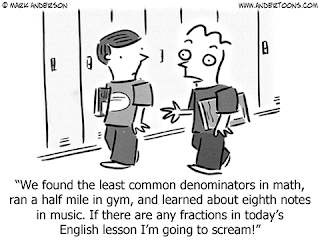Word Study
I have two groups going now, based on Developmental Spelling Assessment data. My Within Word stage group is working on short e and long e (ee and ea) patterns. These students have found some great exceptions to the long e patterns (e.g., been and bread). The Syllable Juncture group is working on compound words. The biggest confusion with compound words is in overgeneralizing. A word may be composed of two words, but is not a compound word if the two words don't define it. For example, carpet is composed of car and pet, but these words do not define the word carpet.
Students began their last group of lower case cursive letters: n, m, v, y, and x. I have started writing our morning message, with possible apple punch rewards, in cursive. I am also encouraging students to try writing their word sorts in cursive, substituting print when they don't know a letter.
I have introduced correct finger assignments for all of the letters on the keyboard and will begin teaching students how to make capitals and use punctuation. We will also practice using common spelling words.
Students are working on verbs this week, specifically linking/being verbs (e.g., is, am, etc.) and present and past tense.
Reading and Writing Workshop
Students are learning that they need to follow the steps below when researching a topic. I have found that identifying a driving question helps them focus a great deal and gives them a lens to consider whether or not a fact is noteworthy, or possibly interesting, but unrelated to their research. Our driving question is "What was Rosa Park's legacy?"
Having selected a text that all students could read and comprehend, we took notes as a class.
I typed up our notes and gave them to students to organize. While most cards can be arranged in sequence of Rosa Parks' life, some were moved to the beginning for a powerful introduction (e.g., "Thomas Jefferson wrote, 'All men are created equal,' in the Declaration of Independence."). Some cards were even left out after careful consideration and great discussion. I encouraged partners to disagree and support why they would change the sequence of cards.
I then modeled, with student discussion, drafting a paragraph from our notes about Rosa Parks.
After I modeled the process, we began the entire process in groups of three using Martin Luther King, Jr. as our subject with the same legacy question. I use Parks and King in modeling because most students have some background knowledge, which helps them in the process. I also want them to study someone new when they repeat the research process independently.
Students research Martin Luther King, Jr. in groups and compare notes.
Math
Comparing fractions. Students should know that
- When the numerator is 0, the fraction is equal to zero.
- When the numerator and denominator are the same, the fraction is equal to one.
- When the denominators are the same, but the numerators are different, the larger numerator is the larger fraction. Students need to understand that this is because they are getting more equal pieces of the same whole.
- When the numerators are the same, but the denominators are different, the larger denominator is the smaller fraction. Students need to know that the smaller denominator represents fewer, but larger equal groups.
Students are learning to simplify fractions using 2/2, 3/3, and 5/5.
Science
We continued our study of renewable and non-renewable resources by creating a model of an oil spill and attempting to clean it up. I'm thrilled that several students repeated this exercise at home. The goal of the lesson is to have them understand the pros and cons of different energy sources,.
Important Dates and Reminders
I will highlight new and changed dates on subsequent posts in red.
Lego Star Wars figures are VERY popular right now. I am implementing a NO TRADE rule to eliminate disagreements over trades and trade-backs. Obviously, students are free to do what they like outside of school.
January 27 - Early Dismissal Professional Development 1pm
February 1 through 16 - Ohio Wildlife Center donation drive
February 15 - No School Presidents' Day
February 16 - Ohio Wildlife Center Visit
The Ohio Wildlife Center (OWC) will visit us to celebrate Valentine's Day. We are going to collect donations to "pay" for their visit. The OWC will bring several indigenous animals (e.g., opossums, turtles, snakes, bats, hawks, owls, etc.) to share with our 3rd graders. Please consider donating to help us continue to bring this great opportunity to Windermere. Students should bring their donations to school on Friday, February 12th. We don't have much room for storing donations prior to that day. Please click on the list below to see what items the OWC needs. Priority items are in yellow. Thank you in advance for your support.
March 2 - Early Dismissal Professional Development 1pm
March 18 - End of Third Quarter
March 21 through 25 - No School Spring Break
March 28 - No School Teacher Grading Day
April 6 - Early Dismissal Professional Development 1pm
April 12 and 13 - Ohio English Language Arts Assessment
April 20 and 21 - Ohio Mathematics Assessment
May 27 - Last Day of School for Students


































